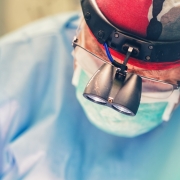Meet The Visionary Doctor Audacious Enough To Propose A Free Market In Healthcare.
Recently, on the Economics For Entrepreneurs podcast, I enjoyed the privilege of talking to Dr. Keith Smith, a visionary who sees a splendid future for healthcare in America, through the lens of free-market entrepreneurial thinking. Here are some highlights.
The market for healthcare in the USA may reasonably be described as the unfree-est of all, given all of the accumulated legislation, the government regulation and restrictions, and the intermediaries and third parties sitting between the physician and the patient. Opaque and generally excessive pricing is one of the many symptoms of this dysfunctional market, but it’s not the only one.
In fact, Dr. Keith Smith, co-founder of the Free Market Medical Association (FMMA), tells us that the challenge is more fundamental even than pricing: it is the bringing together of buyers and sellers. That’s what forms a market, and all the intermediaries and government interventions make the buyer and the seller unable to negotiate the mutually voluntary and mutually beneficial exchange that characterizes a free market.
When I just think about the question, bringing buyers and sellers together, that is an indication of a truly dysfunctional set-up in the market – that that question should even be posed. Buyers and sellers together are typically what forms a market, and that mission of the FMMA, which is very tough work, bringing buyers and sellers together, really has to overcome much that has been thrown in between buyers and sellers. I think whenever we look at the Free Market Medical Association, we have to acknowledge that bringing buyers and sellers together is something that is meant to overcome all of the obstacles that have been placed between them.
Who are the buyers in Dr. Smith’s conception? Of course, buyers include patients and future patients, which means almost all of us. In the short term, Dr. Smith has in mind what economists and marketers would call a “core target consumer”.
A buyer is basically someone who has sticker shock.
Jim Epstein from Reason Magazine picked up on that early, that a buyer is someone whom we would all characterize as an individual who actually cares what it costs, and there are a lot of people in the United States who receive medical services who could care less what it costs because they’re not paying the bill. They don’t have the sticker shock. So our focus in developing a free market must begin with those who actually care.
Beyond the basic buyer-seller functionality, Dr. Smith sees the potential in a free market for a renaissance of healthcare quality.
The second part of this FMMA initiative is the soaring of the quality that is actually delivered. And that’s why this is such a great message – why I get up every day just anxious to tell anyone that’ll listen, this is a good news message. And we’re not really used to good news messages in the medical industry. All you hear is the spiraling cost and the sporadic quality. But what a market does, a true market, when someone says and declares in a marketplace of sticker shocked buyers, “Here is what I do and here is the price I believe should be attached to it,” they’re declaring their own value. And if they’re not any good, then they will not be chosen. People will not vote for them with private funds or the proxies will avoid them because their reputation is on the line as an advising buyer.
So whenever people are not good, whenever people are frauds in a marketplace, they are naturally culled.
Should doctors concern themselves with the non-medical aspects of their patient relationships? Of course, says Dr. Smith. They should be an all-around advocate for the well-being of patients.
Patients should feel confident when they go see their doctor that they have an unapologetic advocate. I think that many physicians are medical advocates. I think most physicians are. But in order to be a complete advocate and to be a financial advocate, I think that physicians have to more and more assume the role that other entrepreneurs assume and bear some risk, and sort of put their chest and shield out there in front of patients. I hear physicians sometimes say, “I just want to practice medicine. I don’t want anything to do with the business or the money side,” and all they’re doing with that cop-out statement is abandoning their patients to the financial wolves, many of whom are happy to step in and make a living off of that physician abandoning that patient.
I don’t think there’s any willful neglect. I just think that we’ve grown up with a system that has exploded so that it’s very difficult to navigate. It’s very creepy. But it’s actually very simple to reject all of the third parties, assume the proper role of the businessman and the entrepreneur, which actually allows the physician to assume the role of financial advocate as well as medical advocate for the patient.
Is this wish for a free market just pie-in-the-sky? Quite the opposite. Dr. Smith himself successfully operates the Surgery Center Of Oklahoma, a clinic providing an array of surgical services listed on a “menu” accompanied by guaranteed prices with no add-ons or hidden fees. Similar providers in different locations around America can be found on the FMMA website. Free-market medicine is already practiced. It’s proven. Now it’s a matter of expansion, which Dr. Smith plans to accomplish via education.
You can practice in a way where you are not leveraged by government money and thrive. Not just survive, but really thrive. The other part is educating everyone. I think that as physicians begin to realize that they need to acknowledge the system that they’re in, and also I think as physicians see that other physicians are unplugging and really seceding from this sick system, and how happy they are, and how successful they are, that tends to get rid of many of the fears that are paralyzing for people who are right on the edge who are ready to make this move.
At Free Market Medical Association, what we’re trying to do is educate everyone that it’s doable, it’s possible, it’s being done, it’s being done increasingly by more and more of the folks who initially said it could not be done.
One major step to take is to expand beyond individual buyers to corporate and other institutional buyers. The core target in this group is self-funded healthcare buyers – companies who provide healthcare services to their employees but choose not to go through insurance companies and consultants and other intermediaries, but to buy direct. Dr. Smith calls them proxy buyers – they are buying on behalf of the individuals who actually consume health care.
Companies whose margins are tighter who have not been self-funded are beginning to self-fund. Keeping in mind that self-funding is where companies buy medical services for their employees out of operating revenue and bear the risk rather than pay an insurance company to bear that risk and make a ton of money for doing so. So, when the proxy buyers, when the self-funded companies step away and quit succumbing to the Kool-Aid sold to them by the brokers and all the other intermediaries, the PPOs, all of those people that are just getting rich off of this current system, when the self-funded buyers walk away from them and look around, they will see this free-market solution is just shining right in front of them. The ticket to save gigantic amounts of money while simultaneously rendering better benefits to employees, while also ensuring that they receive even higher quality care.
That proxy buyer of self-funded companies, when unleashed, will be the reason we experience that tipping point and then everyone will benefit. The individual patients will benefit, because as the market develops and prices fall, prices will fall for everyone. Quality will go up for everyone. This rising tide is going to flood everyone’s fortunes higher and it’s very exciting to think about.
Once this step is taken, Dr. Smith exudes confidence that our long healthcare nightmare is coming to its close.
I am now more optimistic than ever that I’ll see it not just in my lifetime, I’ll see it in my career where the people in this country reject the government’s handling of this industry, selling and auctioning all of these factors to the cronies who have ponied up in Washington and we will see a true market emerge and a real rebirth of the great tradition of medicine for which the United States has been known for quite some time.
An end to the nightmare, of course, will require a loosening of the grip of the Federal Government on healthcare regulation, pricing, and provision.
But ultimately you run into the culprit, the ultimate culprit everyone has to keep in mind is the federal government. It’s Uncle Sam. I tell everyone, we can bash the pharmacy companies, we can bash the PPOs, and they all deserve a good bashing. But Uncle Sam is driving the getaway car. None of these shenanigans are possible without Uncle Sam riding shotgun for all of this thievery.
As with many similar situations, the solution lies in the shift from central control, which the government insists on exerting, to a decentralized ecosystem with individual choice and local responsiveness to market needs. Dr. Smith is a Hayekian.
I think it’s consistent with F. A. Hayek’s concept of the knowledge problem. What’s going on in the market in Arizona is very different, in all likelihood, than what’s going on in the market here in Oklahoma. The response to challenges there, the response to consumer preferences there should be different.
If you are excited, intrigued, or even merely curious about the emerging phenomenon of free-market medicine, there is an upcoming opportunity to attend the Free Market Medical Association 2020 Annual Conference, which is both virtual and live this year.
The date of the conference, the virtual day is the 11th of September and then the next day, the 12th of September is the live part that we’ll have here in Oklahoma City, which also will be viewable by the virtual attendees.
Click the link here to discover more about attendance.
Full podcast transcript here, or listen here.





